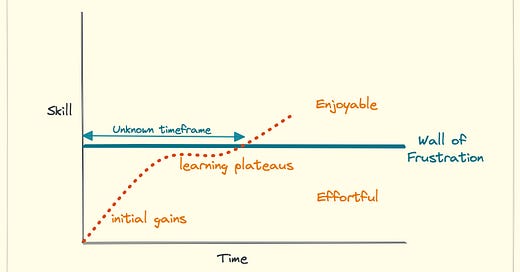This year, I made a different kind of resolution: lower my standards and increase my willingness to be frustrated. Resolve not just to achieve more, but to tolerate more.
It’s easy to imagine a radically different year than the one that just went by. But without different actions, the future will simply be a continuation of the past.
Why is taking different action so hard? Why do we struggle to stick with long-term goals and aspirations?
Conventional wisdom points to motivation, discipline, willpower, and other usual culprits.
But closer observation suggests something more overlooked: our ability to tolerate frustration.
Let’s unpack what I mean.
Hey! It’s Sheril Mathews from Leading Sapiens. Welcome to my newsletter, where I share strategies for getting savvier at leadership and work. Previous editions of this newsletter and articles from my blog are at the bottom of this post.
Frustration: the hidden culprit
We all know frustration. It’s the subtle resistance we feel when progress is slower than expected, when a task feels boring, or when the easier option calls our name.
This past year I wanted to write more, read classic fiction, and get back into running. I struggled because:
Returning to running I found the initial runs slow and demotivating.
Writing is legendary for its frustrating, stop-start process.
Reading at the end of a long day was hard. The TV remote was much easier to reach for. Reducing screen time felt like deprivation.
Notice the underlying mechanism: not wanting to be frustrated and wishing things to be smoother.
This resistance shows up everywhere—meditation, learning a skill, building relationships, or pursuing a career. The problem isn’t the goal itself; it’s our aversion to frustration.
These frustrations are equally prevalent in other domains:
Brilliant strategies falter due to a lack of persistence in execution.
Entrepreneurs navigate constant delays, setbacks and failures
Sales professionals face repeated rejection.
Whether we stick to our goals depends less on glorious willpower and more on our mundane willingness to engage with the inevitable frustrations of process.
Why frustration tolerance matters more than motivation
Motivation is fleeting. Equally, when attempting anything worthwhile, frustration is inevitable.
The difference in whether we persist or fall short often boils down to one simple question: How much frustration are we willing to handle?
When we quit, it’s rarely in a dramatic moment of failure. Instead, it's the accumulation of small, everyday decisions to avoid frustration that ultimately derails progress.
Quitting sneaks in through a series of small, ordinary decisions to avoid discomfort:
Skipping a tough conversation.
Postponing that run.
Reaching for the phone instead of that book.
Over time, these micro-decisions chip away at our long-term aspirations. Goals and ambitions don’t usually blow up in our face. Instead, they slowly fade away and eventually disappear.
Why frustration tolerance is hard
The counterintuitive nature of frustration tolerance
Increasing frustration tolerance is tricky:
Lowering standards: It feels counterintuitive to “lower your standards.” But in this context, it means lowering your expectation of a smooth, easy ride — not the quality of your goals.
Embracing pain: It requires signing up for more discomfort, which runs counter to our instinct for ease. After the initial excitement of progress, plateaus feel stagnant and effortful, tempting us to quit before the breakthrough.
Micro vs. macro: Frustration tolerance plays out in tiny, daily decisions. Yet, the cumulative effects are far reaching. Meanwhile, positive effects of avoiding frustration are immediate while negative effects only show up over time.
Modernity conspires to reduce our tolerance
Entire industries are built around eliminating frustration:
Uber eliminated the frustration of hailing a taxi.
Amazon removed the frustration of shopping in physical stores.
Social media provides instant gratification to kill the frustration of boredom.
While often beneficial, they also reduce our capacity to put up with frustration in other areas of life. We bring the same “standards of smoothness” to learning and working towards goals.
Although in one context frustration is an impediment, in the other it’s the very mechanism through which we learn and grow.
Reframing frustration: the wall as a teacher
Instead of seeing frustration as a barrier, we have to cultivate the habit of viewing it as part of the process — a teacher, not the enemy. Frustration is the crucible in which skill and resilience are forged.
In practice this means:
Accepting the struggle: Frustration signals growth. If it feels hard, you’re in the right place.
Focusing on the long game: Each frustrating moment is a building block for meaningful achievements.
Normalizing discomfort: Reduce “meta-frustration” (being frustrated about feeling frustrated) by recognizing it as a universal experience.
Looking ahead
As we set goals for 2025, it’s worth asking: How much frustration am I willing to tolerate? Often, the success of our resolutions hinges not on how motivated or disciplined we are, but on how often we’re willing to endure the discomfort of frustration.
This year, don’t just resolve to achieve more. Resolve to tolerate more.
Further reading
In my blog, I looked at the clinical definition of frustration tolerance and its application in leadership and organizations:







I think it’s a general sense of discomfort. Even the positive feelings that come from accomplishing a goal can lead to some emotional disruption. For example, when I get hyper-focused on a project, I end up staying up late and not getting as much sleep as I should, which can become uncomfortable over time. There’s that excitement of finishing, that high when it’s done, but then there’s also the low of knowing I need to start another project and go through the whole cycle again.
Another stimulating post, Sheril. You clearly explain why "frustration is the crucible in which skill and resilience are forged" - a very expressive and apt conclusion. Thank you.